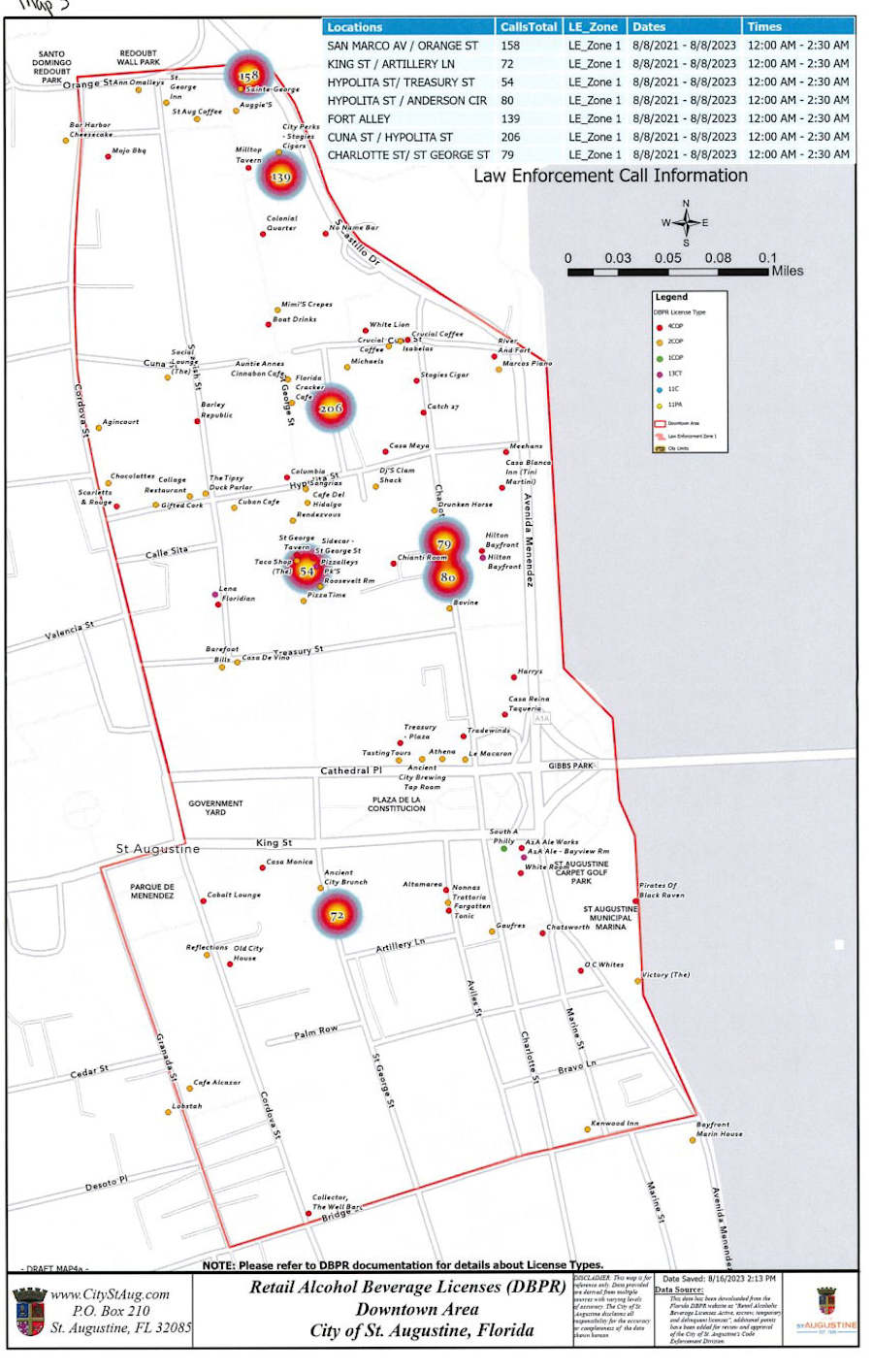ST. AUGUSTINE, Fla. – St. Augustine city commissioners looking to address crime and violence associated with after-hours nightlife held a public meeting Monday to review and discuss a proposed nightlife ordinance that will impact alcohol sales for businesses.
It was a packed house at City Hall for the City Commission workshop, and commissioners and area residents didn’t hold back on sharing what they think of the proposal to “improve” the city’s nightlife.
The city says there has been a noticeable increase in the costs associated with responding to businesses that sell alcohol.
Along St. George and Charlotte Streets between Orange and Bridge Streets, officers have been called more often for issues involving acts of violence and noise complaints over the last two years. The morning after late nights downtown, more trash is in the streets and on sidewalks.

Right now, licensed businesses can serve alcohol until 2 a.m., but one of the proposals in the ordinance is for businesses to have to get a new permit if they want to sell alcohol between midnight and 2 a.m.
Every establishment would need at least one staff member who completed a responsible beverage service training program within the last 12 months.
It would also require them to provide appropriate security, whether through surveillance cameras or hiring security staff.
READ: Full St. Augustine City Commission nightlife ordinance
Jason Bedford with No Name Bar on Castillo Drive said safety isn’t an issue.
“The one thing that proves that this town is safe is the repeat business. The weddings, the bachelorette parties, the vacations,” Bedford said. “Our restaurants are packed because of what we do right, not what we do wrong.”
Tracy Coffman, who lives on Charlotte Street disagrees. She said she made 400 calls to police in the last three years because of unruly crowds and disturbances from late-night bars and restaurants.
“I’ve had drinks thrown on me, people urinating in my yard, cussing me out, threatening me, having sex in my backyard and alleyways,” Coffman said. “I don’t sleep. I am in fear for my life… and all that has been said to me is ‘Move.’”
When it comes to noise complaints, businesses that play music over speakers would need to close all doors and windows after 10 p.m. from Sunday to Thursday and after midnight Fridays and Saturdays.
The proposed ordinance also mentions making the last call for sales of alcohol at 1:30 a.m. for businesses with the extended hours of operation permit.
Melissa Wissel, the city’s communication director, said the proposal makes the rules for every establishment clear so they can be uniformly enforced.
“The ordinance will improve the quality of nightlife for everyone and make it more enjoyable,” Wissel said.
Martin Cleary, manager at Bar None Saloon, said he feels the proposed changes aren’t fair.
Cleary said he doesn’t oppose everything the ordinance mentions. He supports providing adequate security, but he said for a business like the one he works at, to potentially have to get an extra permit to serve alcohol during extended hours is not right.
“That seems like making us pay extra to do what we’re already doing,” he said. “We have a liquor license. It’s pretty expensive to serve liquor until 2 a.m., and I don’t think we should have to pay extra for that hour or two.”
He also suggested that if most businesses are ending alcohol sales at 12 a.m., that might create other safety issues.
“You’re going to have everybody leave every bar in the city at midnight and have everybody on the streets,” Cleary said. “I don’t know, it seems like more of a problem that way.”
Other business owners also agreed that the ordinance was unfair. Some thought the ordinance would make them close early, but Wissel clarified that was not the case. The permit only addresses alcohol sales from midnight to 2 a.m., not whether the establishment is open for business.
Cleary said if this ordinance is passed, he feels it would make it difficult for some businesses to prosper.
“It seems to me you might be creating more of a problem than a solution,” Cleary said.
Commissioners decided to hold a first reading, where they’ll review the ordinance again and take feedback from the public.
A previous similar ordinance did not pass.



